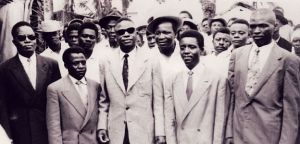
15 January 1971 marks the day of the execution of a Cameroonian and African hero: Ernest Ouandié! Outspoken, and brilliant, Ernest Ouandié is considered by many in Cameroon as a national hero. However, he has never been celebrated the way a hero should. He was a martyr! Ouandié was the last leader of the Union des Populations du Cameroun (UPC). The other renowned leaders of the UPC were Ruben Um Nyobé, Felix-Roland Moumié, Abel Kingué , and Castor Osendé Afana who, except Abel Kingué, were all assassinated by France or its puppets. Like those three, Ernest Ouandié was also assassinated, and paid with his life for his passion for the freedom of Cameroon, and Africa, from colonialism. So who was Ernest Ouandié?
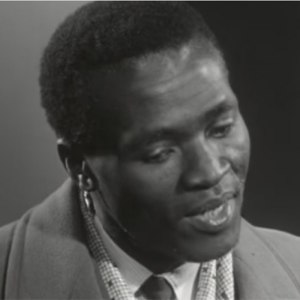
Ernest Ouandié was born in 1924 in Badoumla, Bana district in the Haut-Nkam region of the Western province of Cameroon . He attended public school in Bafoussam, and then l’Ecole Primaire Supérieure de Yaoundé where he obtained a Diplôme des Moniteurs Indigènes (DMI) in November 1943 and began work as a teacher. In 1944 he joined the Union of Confederate Trade-Unions of Cameroon, affiliated with the French General Confederation of Labour (CGT). From 1944 to 1948, Ernest Ouandié taught in Edéa. On 7 October 1948, he was posted to Dschang. A month later, he was posted to Douala as director of the New-Bell Bamiléké public school.
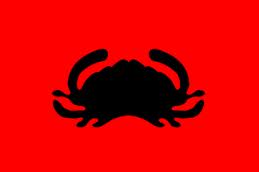
In 1948 Ouandié became a member of the Union of the Peoples of Cameroon (Union des Populations du Cameroun – UPC), and 4 years later, was elected vice-president of the UPC. In September 1953 he was assigned to Doumé and Yoko in Mbam-et-Kim. In December 1954 he was posted to Batouri, then Bertoua. Finally, in January 1955 he was assigned to Douala again. He attended the World Congress of Democratic Youth in China in December 1954, and also traveled to Paris and Moscow.

In April and May 1955 the UPC held a series of militant meetings, circulated pamphlets and organised strikes. On 20 June 1955 the UPC leader, Ruben Um Nyobé, was sentenced in absentia to six months in prison and a large fine. On 13 July 1955 the French government dissolved the UPC by decree. Most of the UPC leaders moved to Kumba in the British-administered Southern Cameroons to avoid being jailed by the colonial power. Armed revolution broke out in Cameroon. The UPC nationalist rebels conducted a fierce struggle against the French, who fought back equally ruthlessly. The insurgents were forced to take refuge in the swamps and forests. Ruben Um Nyobé was cornered in the Sanaga-Maritime area and killed on 13 September 1958.
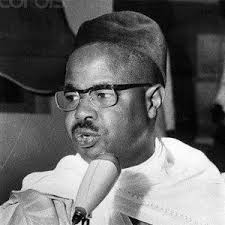
Ouandié had taken refuge in Kumba in 1956. In July 1957, under pressure from the French, the British authorities in western Cameroon deported Ernest Ouandié and other leaders of the UPC to Khartoum, Sudan. Ouandié then moved in turn to Cairo, Egypt, to Conakry, Guinea and finally to Accra, Ghana. After Cameroon gained independence in 1960, UPC rebels who had been fighting the French colonial government continued to fight the government of President Ahmadou Ahidjo, whom they considered to be a puppet of the French. Ahidjo had asked the French to lend troops to keep peace during and after the transition to democracy. What followed is a campaign of pacification of the Bamiléké territory, and some regions in the Centre and Littoral provinces; this is one of the greatest genocides committed by France, with the death toll in the hundreds of thousands (French President Acknowledges French Genocide in Cameroon)!
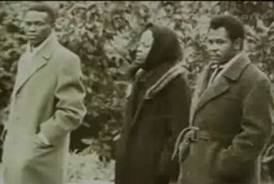
In 1960 Ouandié, Félix-Roland Moumié, Abel Kingué and other UPC leaders were exiled, isolated and desperate. Moumié was poisoned by French agents using thallium on 13 October 1960 and died on 4 November 1960, leaving Ouandié as head of the UPC. On 1 May 1961 the military tribunal in Yaoundé condemned Ouandié and Abel Kingué (in absentia) to deportation. That year, Ouandié secretly returned from Accra to Cameroon to work towards the overthrow of the Ahidjo regime. The Southern Cameroons (now the Southwest and Northwest regions) gained independence from the British and joined a loose federation with East Cameroon on 1 October 1961. Abel Kingué died in Cairo on 16 June 1964, leaving Ouandié the last member of the original leadership. President Ahidjo then declared Ouandié public enemy number one.
A post-colonial struggle by UPC rebels opposing the new Cameroon army (trained and armed by France) continued until August 1970 when the last battalion of the UPC, commanded by Ernest Ouandié, was arrested. Ouandié was sentenced to death and was shot by a death squad in the market on 15 January 1971, in Bafoussam. That day was a historic day in Bafoussam, as the populations were forced to witness the execution of their leader: my mother witnessed the event, she was just a child. The civil war, resulting in the destruction of villages and use of napalm is estimated to have resulted in at least 30,000 to 500,000 deaths. It has been conveniently removed from official history, both in Cameroon and in France (French President Acknowledges French Genocide in Cameroon).
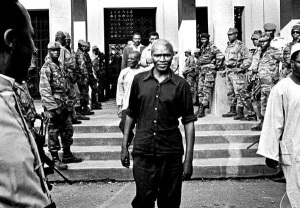
On that fateful day, 15 January 1971, three people were executed in Bafoussam, the capital of the Western region. The three were Gabriel Tabeu, alias “Wambo, the electricity“, Raphael Fotsing (condemned to capital punishment 10 days prior, by a military tribunal) and Ernest Ouandié. The three were tied to a pole, facing a firing squad. The first two fell first. Ernest Ouandié, who had been accused of attempting to create a revolution, the organization of armed bands, assassinations and other things, refused to be blindfolded. This led to a dispute between the authorities and him. Finally, they granted him his final wish, and as he was falling through the weight of the bullets, he shouted “Others will continue the struggle” staring death in the eye.
Check out the website Grioo.com where there is a good biography on Ernest Ouandie’s life. Don’t forget to check out the website of Dibussi Tande. The great Cameroonian writer Mongo Béti wrote the book Main basse sur le Cameroun, autopsie d’une décolonisation (about the Cameroonian resistance led by the UPC) which was banned in France in the 70s, which led to him to write Remember Ruben in honor of Ruben Um Nyobé’s memory, in which he describes the firing squad to Ouandié’s execution.


Love your blog! Thank you for this valuable education. There is so much that Black people don’t know and we need more blogs like this. Today we in America Celebrate and Honor the birth and legacy of Dr. Martin Luther King, Jr. As Dr. King says in the Video, Let’s Get the Language right and Let’s be proud of our race, skin color and heritage!
LikeLiked by 1 person
Thank you so much dancingpalmtrees for your kind comment. Yes, there is so much that we, as Black people, don’t know, and we have to change that. Happy Martin Luther King Jr. Day
LikeLiked by 2 people
Thanks. Enjoy your day.
LikeLiked by 1 person
This was another educational article that I’m grateful for. Cameroon has been another country I’ve been researching a lot on. Shame on them who’ve stricken him from the history books. Good job on making sure the memory of Ernest Ouandie lives on. There’s so much people don’t know about.
LikeLike
Yes… there is so much people do not know about, and we have a duty to educate them, and refresh the memories. Thanks for commenting.
LikeLiked by 1 person
Exactly. I’ll definitely study up on Ouandie and more about Cameroonian history. That and the Congo have been on my radar for African the most recently.
LikeLike